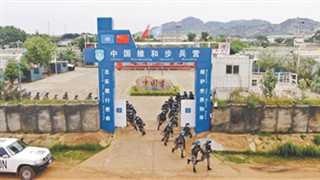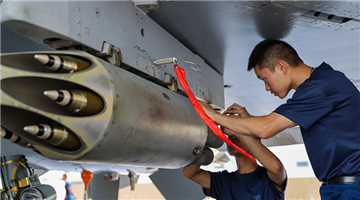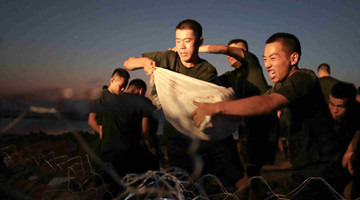Editor's note: To celebrate the 100th anniversary of the founding of the Communist Party of China, we are launching the “Outstanding CPC Members in the PLA” series, featuring the heroes and role models in the PLA who have made selfless dedication to defending the country, serving the people and building a strong military. The following is the 11th story of the series.

Li Xiangqun was born in a well-off family in Qiongshan district of Haikou, capital city of South China's Hainan province. In December 1996, he joined the Chinese People's Liberation Army (PLA) and served in the 9th Company of an infantry regiment under the former PLA Guangzhou Military Area Command (2nd Company, 1st Battalion of an infantry brigade of the 75th Group Army under the PLA Southern Theater Command today).
In the army, Li was strict with himself and won merit citations three times on the regiment, battalion and company level. At the end of 1997, he was selected as “Excellent Soldier” of his regiment. In April 1998, he was awarded the Third Class Citation for Merits for his outstanding performance in completing the cable-laying task.
On August 5, 1998, the regiment Li was serving in arrived in Jinzhou City of Hubei province to engage in the Yangtze River flood fighting operations. On August 13, a piping effect appeared in a floodgate at the Taipingkou channel of the Yangtze River, Li dived into the torrential river to locate the opening, but ended up with a 4-cm bleeding wound on his left foot by the sluice gate. After locating the opening and getting ashore, he immediately joined his buddies to plug the opening without having a rest.
On the morning of August 17, Li, who had been working in the anti-flood frontline for 14 hours on end, caught fever and felt dizzy; but he held on firmly despite his temperature shooting up to 40℃, and finally passed out in the afternoon.
At about 14:00 on October 19, another piping effect was detected at the Yangtze River dyke in Nanping Town of Gong’an County, 60 km south of the Jinzhou City. Li, who had been put on a drip in the clinic at the time, pulled out the vein puncture needle when hearing the assembly whistle and ran to the dyke to join the work of carrying sand bags to reinforce the dyke. However, he tottered and passed out again after carrying dozens of sand bags. He was sent back to the clinic again.
At 8:00 a.m. on October 21, a landslide happened at the Yangtze River dyke in Nanping Town, and Li Xiangqun jumped out of his sickbed and joined the anti-flood troops again after hearing the assembly whistle. At 10:00 or so, he fainted for the third time. Villagers carried him to a shady spot for a rest. About 15 minutes later, he woke up and continued to carry sandbags regardless his buddies’ persuasion. This time, after carrying more than 20 sandbags, he fainted again on the dyke due to extreme fatigue with blood gushing out of his mouth.
In the emergency clinic of the Second People’s Hospital of Gong’an County, Li Xiangqun came to life after half an hour’s emergency rescue. While in a critical condition, he asked in a weak voice his political instructor Wang Zhanfei, “do we have tasks tonight? Please take me…”
In the afternoon, Li was rushed to Wuhan for rescue. Due to extreme fatigue, he suffered from heart failure and massive bleeding in his lungs. He passed away at 10:10 a.m. on August 22 after multiple rescue attempts failed.
The former Guangzhou Military Area Command conferred Li Xiangqun the honorary title of “Flood Fighter”. In 1999, the Central Military Commission awarded him the honorary title of “Heroic Soldier of the New Era”.
?











